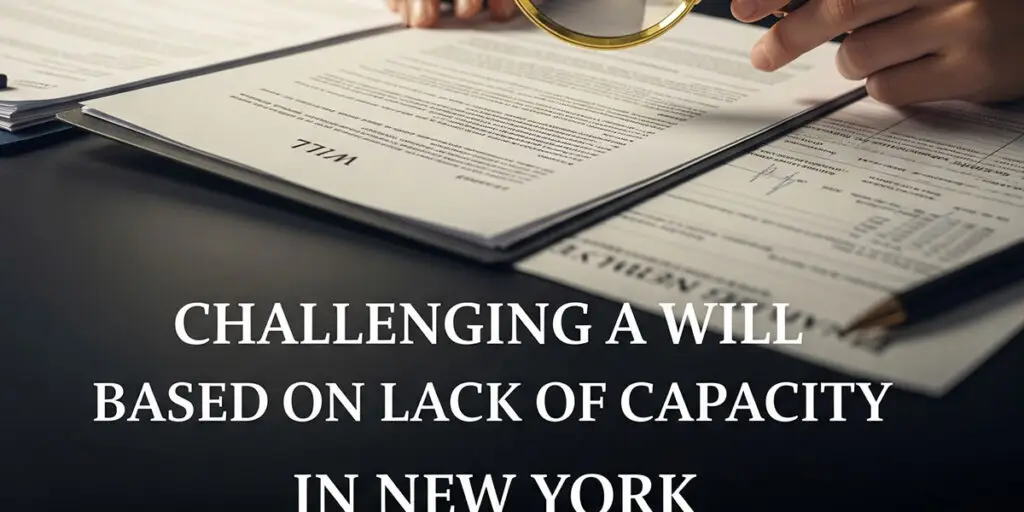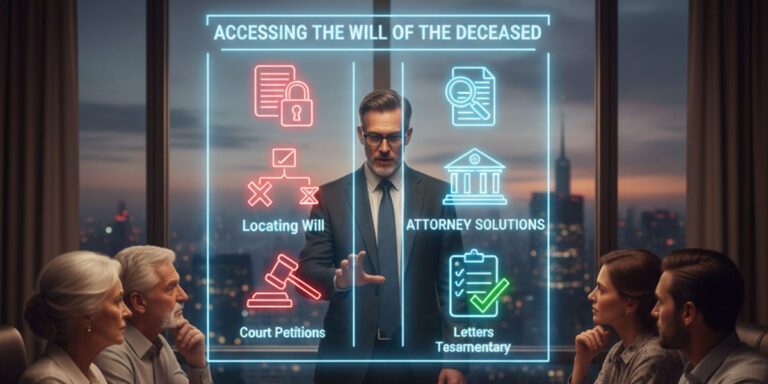Challenging a Will Based on Lack of Capacity in New York: Understanding the Legal Standard and Protecting Your Rights
When a loved one passes away, disputes over their will can arise, particularly if there are concerns about the testator’s mental competence at the time the will was signed. In New York, one of the most common grounds for challenging a will is lack of testamentary capacity, which means the testator did not have the mental ability to understand the nature and consequences of making a will. If you are in this situation, you’re likely unsure of what the next steps are. Proving a lack of capacity can be complex and requires careful examination of the evidence. At Morgan Legal Group, serving New York City and beyond, we provide experienced and compassionate legal representation to individuals challenging wills based on a lack of capacity, helping them protect their rights and ensure the deceased’s true wishes are honored. This comprehensive guide will examine the legal standard for testamentary capacity in New York, the types of evidence used to establish or refute capacity, and the steps involved in contesting a will. You may be unsure of where to start, so keep reading to be informed.
What Does “Lack of Capacity” Mean? Understanding the Legal Standard
In New York, to have testamentary capacity, the testator must understand:
- That they are signing a document that will distribute their assets after their death
- The nature and extent of their property
- The identity of their beneficiaries
The testator must have a general understanding of these key elements at the time the will is signed, or they do not have these factors in place at the time of signing. This has an effect on all of their choices.
The testator does not need to be a legal expert or have perfect mental clarity. They simply need to have a general understanding of these core concepts. Even with this said, there is a high standard of living, and there are legal standards to uphold. You should consult with an attorney.
Common Conditions That May Impair Testamentary Capacity
Several conditions can impair a person’s ability to have testamentary capacity, including:
- Alzheimer’s Disease and Dementia: These conditions can cause cognitive decline and memory loss, affecting a person’s ability to understand their assets and beneficiaries.
- Stroke: A stroke can damage the brain and impair cognitive function.
- Traumatic Brain Injury: A traumatic brain injury can also lead to cognitive impairment.
- Mental Illness: Certain mental illnesses, such as schizophrenia or bipolar disorder, can affect a person’s ability to make sound decisions.
- Medication Side Effects: Some medications can cause confusion, drowsiness, or other side effects that impair cognitive function.
Evidence of these conditions can be used to support a claim of lack of testamentary capacity. Expert medical testimony is often crucial in these cases. Seeking medical assistance may be beneficial. In addition to maintaining order, all the documentation you have is essential.
Gathering Evidence: Proving Lack of Capacity in Court
Proving a lack of capacity in court can be challenging. The evidence can vary. However, it will be up to your trusted attorney to recommend.
Potential sources of evidence:
- Medical records
- Witness testimony from family members, friends, and caregivers
- Statements from the attorney who drafted the will
- Financial records
Medical records are often the most important piece of evidence. Witness testimony can be valuable in providing context and illustrating the testator’s mental state at the time the will was signed. The more evidence, the stronger your case. Take what you can get to help secure your case.
The Importance of Medical Records: Documenting Cognitive Decline
Medical records can provide objective evidence of a testator’s cognitive decline or mental impairment. Look for records that document:
- Diagnoses of Alzheimer’s disease, dementia, or other cognitive disorders
- Memory loss or confusion
- Difficulty with reasoning or problem-solving
- Changes in personality or behavior
- Medication side effects
Medical records can be particularly persuasive evidence of a lack of capacity. They are often the deciding factor for many. The value is in what you find with the records. It is what often will prove your innocence or wrongdoing. An attorney with experience in this setting can help.
Lay Witness Testimony: Providing Personal Observations and Insights
Testimony from family members, friends, and caregivers who interacted with the testator can provide valuable insights into their mental state at the time the will was signed. This is why is has much value. They can discuss the past events and other things. The information you collect from these discussions can be very helpful.
Lay witnesses can testify about:
- Changes in the testator’s memory, behavior, or personality
- The testator’s ability to understand complex information
- Instances of confusion or disorientation
- The testator’s reliance on others for assistance with daily tasks
Personal observations can paint a vivid picture of the testator’s mental state. They can also provide important context. Lay testimony adds color to the clinical data. These different points of view will assist everyone involved.
The Attorney’s Role: Assessing Capacity and Documenting the Process
The attorney who drafted the will has a responsibility to assess the testator’s capacity to make a will. The attorney should:
- Meet with the testator privately to assess their understanding of the will and their assets
- Ask questions to gauge the testator’s mental state
- Document their observations and assessment in their file
The attorney’s testimony about the testator’s capacity can be valuable evidence in a will contest. That attorney can also be of help. It is best to find that out. You must be prepared to share these details if questioned in court.
Financial Records: Evidence of Confusion or Poor Decision-Making
Financial records can provide evidence of a testator’s cognitive decline or inability to manage their finances. Reviewing these records can help with the decision-making process. The attorney will also be there to assist with what they need to be effective in court.
Red flags to look for:
- Unusual or unexplained financial transactions
- Failure to pay bills
- Inability to balance a checkbook
- Susceptibility to scams or financial exploitation
Financial records can help paint a picture of the testator’s mental state. They also offer a look into the testator’s mind and financial capabilities.
The Importance of Timing: When Did the Incapacity Occur?
To successfully challenge a will based on lack of capacity, you must prove that the testator lacked capacity at the time the will was signed. Evidence of cognitive decline or mental impairment before or after the will was signed is relevant, but it’s not as persuasive as evidence of incapacity at the time of execution. The time of the signing is important and crucial to your case. Consult the right documents to see that it has taken place properly.
Focus on gathering evidence that relates to the testator’s mental state on the day the will was signed. You must have a sound mindset at the time of signing, or your entire plans may be at risk. The team can assist with this type of legal action.
Undue Influence vs. Lack of Capacity: Understanding the Difference
Lack of capacity and undue influence are two separate grounds for challenging a will. Lack of capacity focuses on the testator’s mental ability to understand the will. Undue influence, on the other hand, focuses on whether someone pressured or coerced the testator into making a will that did not reflect their true wishes. To be able to have what you believe to be right, there needs to be an understanding of those steps. Seek assistance from an experienced expert. You must be able to identify the correct legal problem.
A skilled attorney can help you determine which ground for challenge is most appropriate in your situation. You will be working with an attorney at Morgan Legal Group P.C., and they can answer these hard-hitting and important questions. They can offer what you need to get the help you require for the case.
The Process of Challenging a Will in New York Surrogate’s Court
Challenging a will in New York Surrogate’s Court involves a specific legal process that must be followed carefully. It is best to take your time with all aspects so there are no regrets. There can be a lot of pieces and elements to take care of so do not rush. It is best to have a competent attorney to handle the heavy lifting for you.
Legal Assistance for Challenging A will:
- Filing a petition with the court
- Gathering evidence to support your claim
- Participating in discovery (e.g., depositions, document requests)
- Attending a trial or hearing
You will want to be familiar with this process so you are prepared. Following the legal process may mean a more streamlined and secure transaction.
The Role of a Probate Attorney in Challenging a Will
Challenging a will can be a complex and emotionally challenging process. Working with an experienced probate attorney is essential for protecting your rights and achieving the best possible outcome. An experienced attorney will assist you. You will want someone with what it takes.
Look for an attorney who:
- Has experience handling will contests
- Is knowledgeable about New York estate law
- Has strong litigation skills
- Is compassionate and understanding
Having the right attorney on your side can make all the difference. Find someone who puts your safety first.
Protecting Your Rights with Morgan Legal Group
At Morgan Legal Group, we understand the complexities of will contests and are committed to providing personalized and effective legal services to individuals and families throughout New York City and beyond. Our experienced attorneys can help you evaluate your case, gather evidence, and represent your interests in Surrogate’s Court. Contact us today to schedule a consultation and learn more about how we can help you protect your rights and ensure that justice is served. Let Morgan Legal Group P.C. be your greatest asset. Contact us today or see more about our offers by visiting us on our Google Maps Profile – Google Business Profile.
Morgan Legal Group proudly serves the New York City community, including the Bronx, Brooklyn, NYC, Queens, and Staten Island. If you are outside of New York City, we also serve Long Island, including Suffolk County. As well as Westchester, Ulster County, and Orange County.NY Courts





